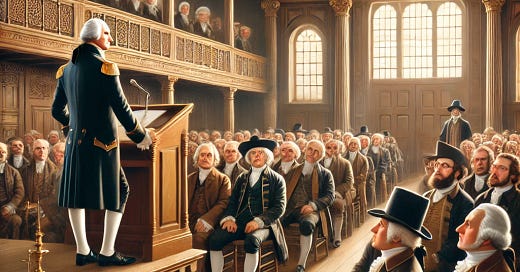Today, on Presidents Day, I revisited one of the most powerful statements on religious liberty in American history: George Washington’s 1790 address to the Touro Synagogue in Newport, Rhode Island.
In it, Washington declared that the government of this country "gives to bigotry no sanction, to persecution no assistance."
What a line! And what a sentiment to express in a nation still in formation.
Washington was quoting Moses Seixas, the warden of Touro Synagogue, who had first written to him.
This exchange has since become a foundational text for the right to religious liberty in America.
Can These Words Guide Us Today?
Absolutely. They offer three key lessons:
1. Leaders' Words Matter
You may know the old saying: "Sticks and stones may break my bones, but words will never hurt me."
That’s wrong. Words have immense power—they can heal and they can harm, they can connect and they can divide.
Washington’s words connected the citizens of a new nation. For Jews in 1790, who had faced centuries of persecution in Europe, his message was profoundly significant.
One group targeted for thousands of years now had a home. By explicitly welcoming them as full citizens, Washington was making a radical statement for his time.
2. Government Policy Matters
The first colonists fled a British government that persecuted them for their beliefs. They sought religious freedom. Washington wanted to ensure that Americans would never face that challenge again.
As a result, the U.S. Constitution deliberately does not mention God and explicitly prohibits any religious test for public office.
The First Amendment's Establishment Clause and Free Exercise Clause enshrined what Thomas Jefferson later described as a "wall of separation between church and state."
3. Core Values Matter
America is the most religiously active and devout country in the Western world, yet one of the few where the government does not fund or officially sanction religious institutions.
This reality has made American religious life entrepreneurial and responsive. If churches and synagogues want to thrive, they must engage and inspire their communities without government support.
The result? More participation, more innovation, more vibrancy.
George Washington understood this. He knew religious groups were essential to the republic’s future, but he also knew the best way to ensure their strength was to leave them alone.
As the Bible puts it, "Our strength will come from the Lord, who made heaven and earth." (Psalm 121:2)
Like those ancient words, Washington’s message still resonates today: true religious vitality springs from congregations gathering in freedom, passing down their trad
This Presidents Day, let’s remember the promise Washington made—a promise that still calls us to give “bigotry no sanction” and “persecution no assistance.”




